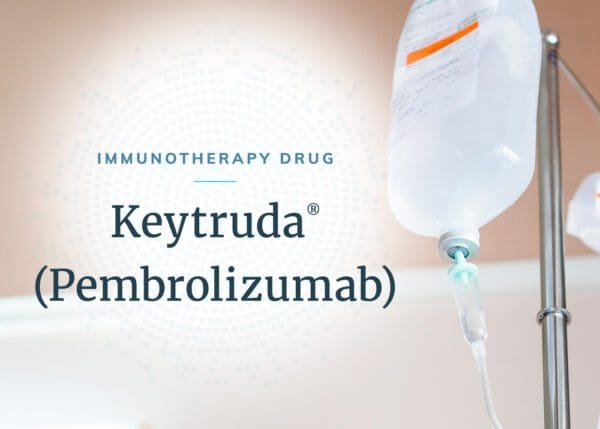01. What Is Keytruda?
What Is Keytruda (Pembrolizumab)?
Keytruda® (pembrolizumab) is an immunotherapy drug that may extend life expectancy for mesothelioma patients. Immunotherapy drugs work with a patient’s immune system to kill cancer cells. Keytruda is categorized as an immune checkpoint inhibitor. It blocks a protein on immune cells, which allows them to recognize and kill cancer cells.
Keytruda earned its first approval from the U.S. Food and Drug Administration (FDA) in 2014. At the time, the drug approval only included treatment of certain types of melanoma. However, positive results in clinical trials have expanded indications for Keytruda. In 2016, the FDA approved Keytruda to treat metastatic non‐small cell lung cancer (mNSCLC). It now has approval for treating more than 10 different types of cancer.
One of Keytruda’s approved uses may cover some mesothelioma patients. Doctors can prescribe Keytruda for patients whose cancers fall into a category called TMB-H. TMB-H stands for tumor mutational burden-high. TMB-H means that tumor cells have a high number of genetic mutations. Some mesothelioma tumors fall into the TMB-H category. Doctors may prescribe Keytruda in such cases.
02. Keytruda and Mesothelioma
How Does Keytruda (Pembrolizumab) Treat Mesothelioma?
Keytruda is an immunotherapy drug called an immune checkpoint inhibitor. Keytruda works by blocking the PD-1/PD-L1 immune checkpoint. This checkpoint function is similar to a secret handshake. The PD-L1 protein on a cancer cell can “shake hands” with the PD-1 protein on a T cell, a type of immune cell. This tells the T cell to ignore the cancer cell, shielding the cancer cell from attack.
When Keytruda blocks the checkpoint, mesothelioma cancer cells cannot use it to hide. This allows T cells to recognize and kill cancer cells.
Keytruda for Pleural Mesothelioma
Keytruda may be used to treat pleural mesothelioma. In one study, median overall survival from the start of Keytruda treatment for pleural patients was 18 months.
When coupled with other treatments, Keytruda may extend survival even longer. One study tested Keytruda with another form of immunotherapy in stage 3 and 4 patients who had already received another type of treatment. Median overall survival was nearly 24 months.
Keytruda for Peritoneal Mesothelioma
Keytruda has also been tested as a treatment for peritoneal mesothelioma patients. Studies for this type of mesothelioma are less robust but indicate improved survival for some patients.
Keytruda for Asbestos-Related Lung Cancer
Mesothelioma is not the only asbestos-related cancer Keytruda can treat. This immunotherapy drug can also treat some forms of NSCLC. Doctors can use Keytruda alongside platinum and pemetrexed chemotherapy for qualified cases of NSCLC.
In one study, patients with NSCLC received chemotherapy and Keytruda. Median survival was 22 months. Compared to chemotherapy alone, Keytruda more than doubled survival.
Resources for Mesothelioma Patients
03. What to Expect
What to Expect During the Keytruda (Pembrolizumab) Treatment Process
Keytruda is administered via IV (intravenous therapy). IV infusions take about 30 minutes and occur every three weeks. Courses of treatment may continue for up to two years or longer if effective and well-tolerated.
Keytruda is used as a second-line treatment for mesothelioma patients whose disease did not respond or recurred after first-line treatment with either surgery, radiation or chemotherapy. Using the medication as a second-line treatment has shown promising results in multiple clinical trials to date.
04. Survival With Keytruda
Survival After Keytruda (Pembrolizumab) for Mesothelioma
Several clinical studies have evaluated the effect of Keytruda on mesothelioma prognosis. Median survival for pleural mesothelioma patients receiving Keytruda ranges from 10 to 18 months.
Mesothelioma Survival in the KEYNOTE-028 Clinical Trial
The KEYNOTE-028 clinical trial involved 13 different sites across six countries. It was one of the earliest studies to report success in treating malignant pleural mesothelioma with Keytruda. Study participants had previously received chemotherapy or did not qualify for standard treatment. Researchers reported several encouraging results:
- 56% of patients experienced a reduction in tumor size.
- Patients experienced about five months with no tumor progression.
- Median overall survival reached 18 months.
This median survival result falls among the best reported for second-line mesothelioma therapy. The success of this early trial may have motivated researchers to continue studying this drug.
Mesothelioma Survival After Keytruda (Pembrolizumab) Combination Immunotherapy
Another mesothelioma clinical trial investigated Keytruda as part of a combination treatment. The combination extended survival to nearly two years. Researchers achieved this by combining Keytruda with another immunotherapy: CAR T cells.
Prior to the study, participants had already received at least one form of mesothelioma treatment. After enrolling, pleural mesothelioma patients first underwent CAR T-cell therapy. Weeks later, they received Keytruda. Researchers found Keytruda helped the CAR T cells fight cancer.
Patients receiving Keytruda with CAR T cells had a median survival of 23.9 months. Notably, more than 70% of the patients in this study had late-stage mesothelioma. Mesothelioma life expectancy in later stages ranges from 12 to 16 months. This means CAR T cells and Keytruda may have improved survival by a year for these patients.
Mesothelioma and Keytruda (Pembrolizumab) Research Is Ongoing
The efficacy of Keytruda for mesothelioma is still being tested, with various ongoing studies. Several active mesothelioma clinical trials include Keytruda as part of their treatment approach.
In some studies, Keytruda will provide one part of a multimodal mesothelioma treatment. This may prove beneficial, as multimodal treatment has come the closest to a mesothelioma cure.
05. Side Effects of Keytruda
Side Effects and Risks of Keytruda (Pembrolizumab)
Side effects with Keytruda are typically mild, though common. In the KEYNOTE-028 trial, 64% of mesothelioma patients who received Keytruda reported at least one side effect. The most common side effects were nausea and fatigue, reported by 24% of patients. Other common Keytruda side effects include joint stiffness, itching, decreased appetite and dry mouth.
None of the study patients discontinued treatment due to severe side effects.
The common side effects are relatively mild among pleural mesothelioma patients treated with Keytruda. However, some patients with other cancers have experienced more serious reactions.
In certain cases, Keytruda patients have had immune-mediated responses or autoimmune reactions. This means Keytruda may allow the patient’s immune system to attack healthy tissues or cause other problems. Such reactions are considered uncommon and may resolve after discontinuing treatment.
Any patient interested in Keytruda should discuss it with an oncologist. Mesothelioma patients can discuss side effects and advantages with their doctor. A mesothelioma expert can help patients weigh the benefits and risks of standard and emerging treatments.
06. Eligibility for Keytruda
Eligibility for Keytruda (Pembrolizumab)
Keytruda has FDA approval for use in patients with TMB-H classified tumors. This means mesothelioma patients with the following characteristics may qualify for Keytruda treatment:
- Doctors consider the patient’s case inoperable.
- The patient has no other satisfactory treatment options.
- The patient has received another treatment first, and the cancer has progressed despite treatment.
- The patient’s tumor falls into the TMB-H category. TMB-H status means the tumor has a high number of genetic mutations.
Keytruda has not achieved approval in mesothelioma specifically. Still, some experts see a role for the checkpoint inhibitor in some mesothelioma cases. For instance, the National Comprehensive Cancer Network (NCCN) includes Keytruda in its treatment guidelines. NCCN recommends Keytruda as a potential second-line treatment for pleural mesothelioma.
Any mesothelioma patient considering Keytruda should discuss their options with a doctor. A mesothelioma doctor can help them understand the risks and benefits of available therapies. Together, the patient and doctor can devise the best approach for the patient’s unique situation.
07. Common Questions
Common Questions About Keytruda (Pembrolizumab)
-
Can Keytruda cure mesothelioma?
- No studies have shown that Keytruda can cure mesothelioma or lung cancer. However, Keytruda may be a good option for certain patients to improve life expectancy and quality of life. Keytruda has also helped a small number of cancer patients achieve remission.
-
How much does Keytruda cost?
- Before insurance coverage, Keytruda doses given every three weeks cost about $10,900. However, patients will often pay significantly less than the list price after insurance coverage. For example, 38% of patients with a Medicare Advantage plan paid no out-of-pocket costs for Keytruda. For patients who do need to pay out-of-pocket costs,
mesothelioma financial assistance may help cover these.
A patient’s out-of-pocket costs will vary based on their full coverage and treatment details. Insurance providers and healthcare professionals can help patients estimate the full cost of Keytruda treatment.










